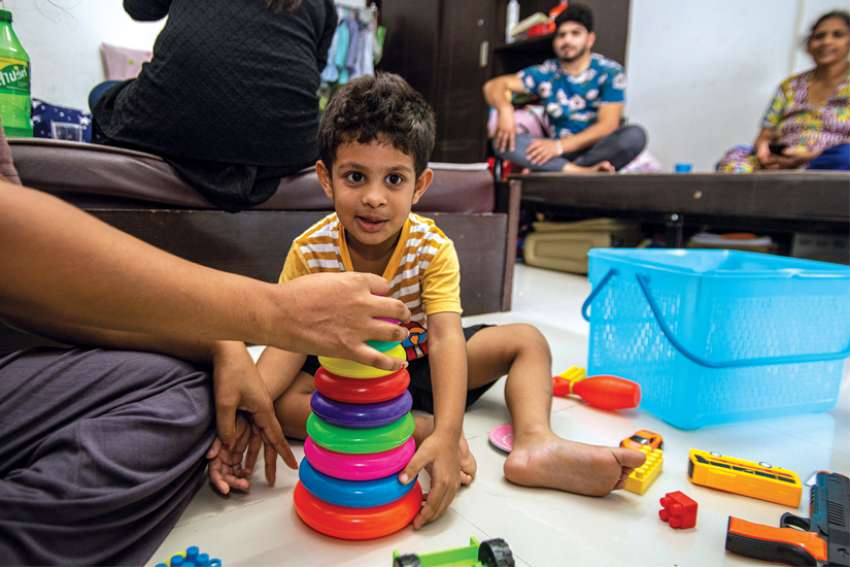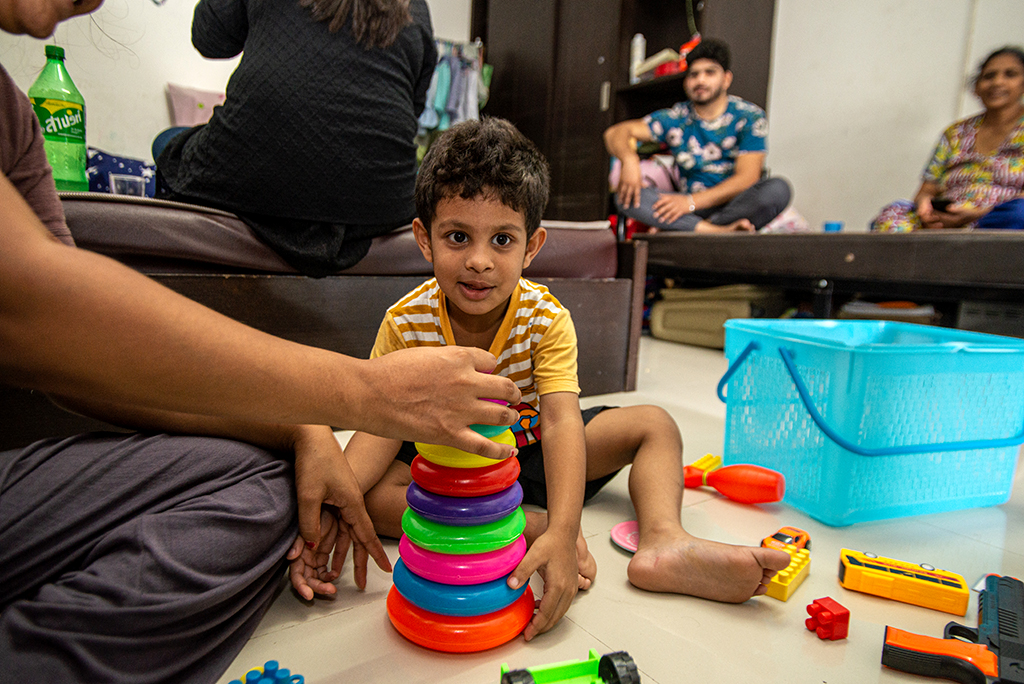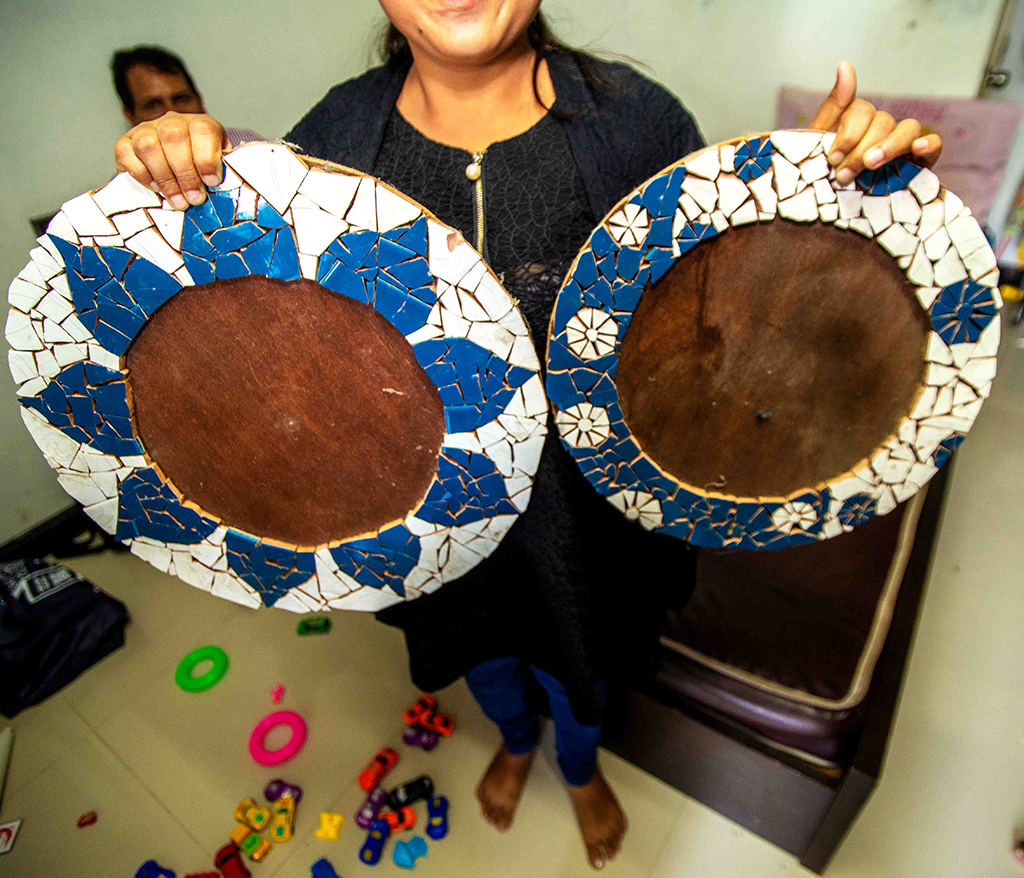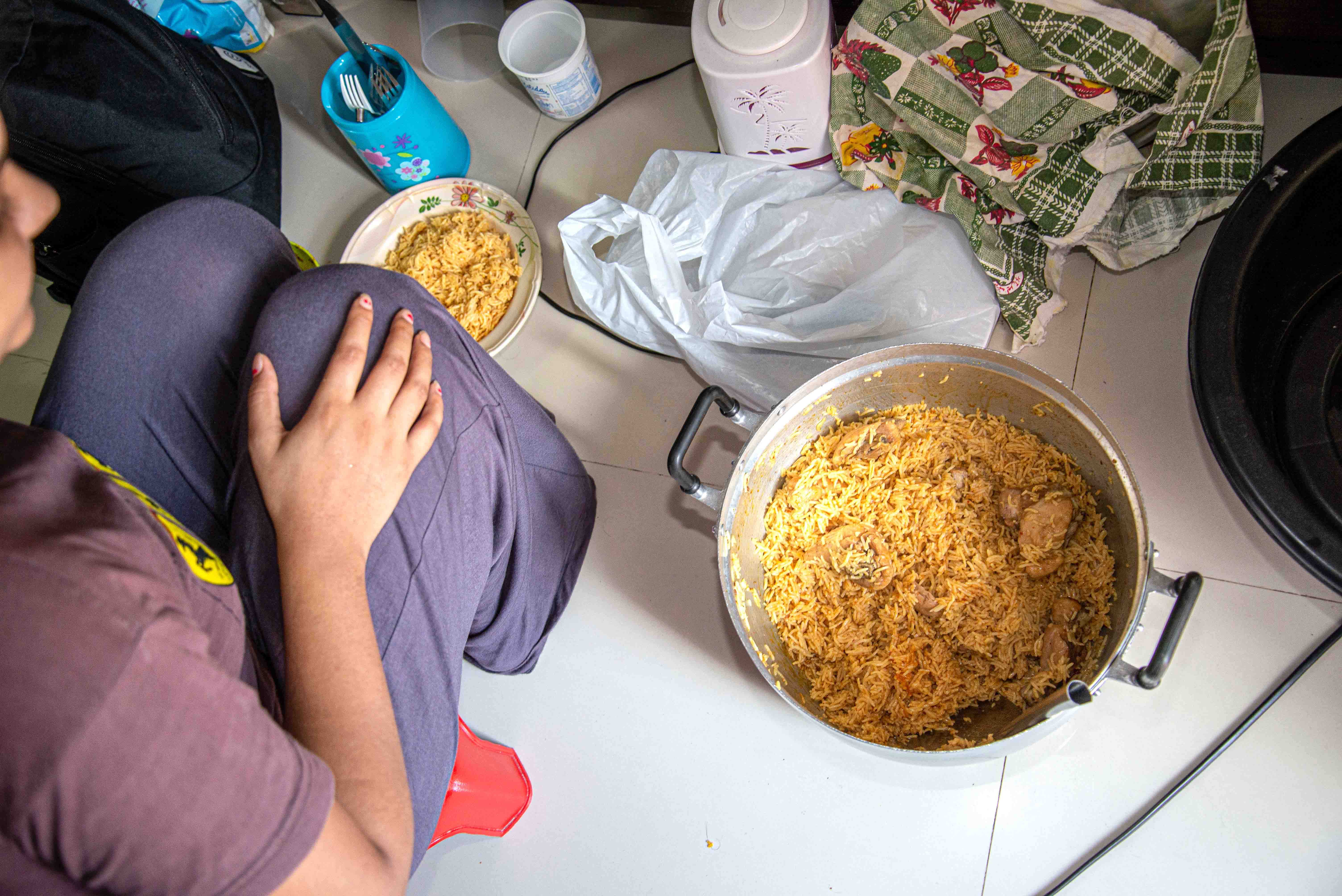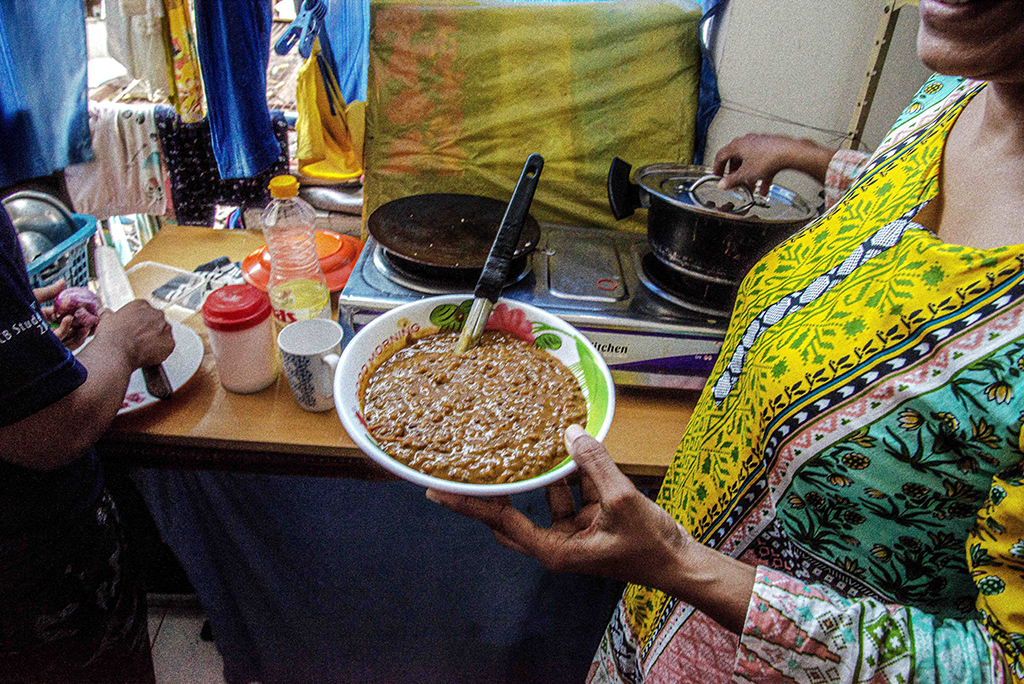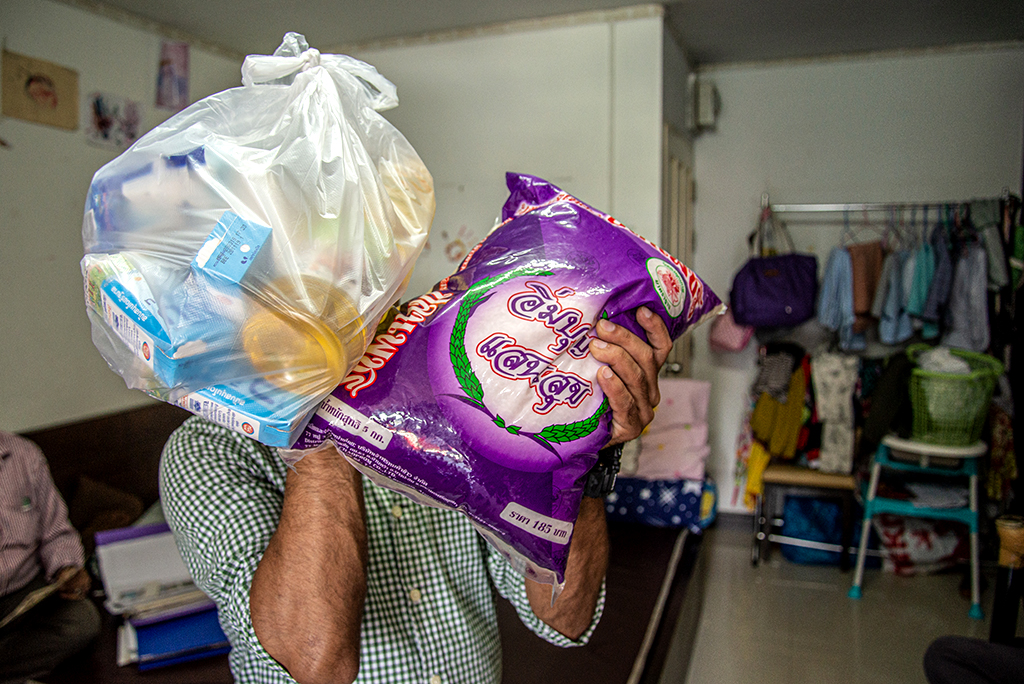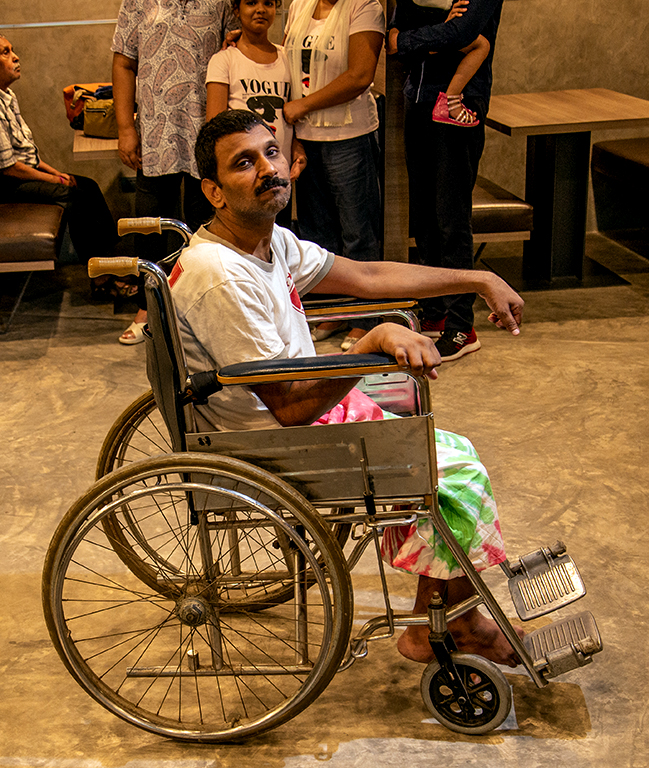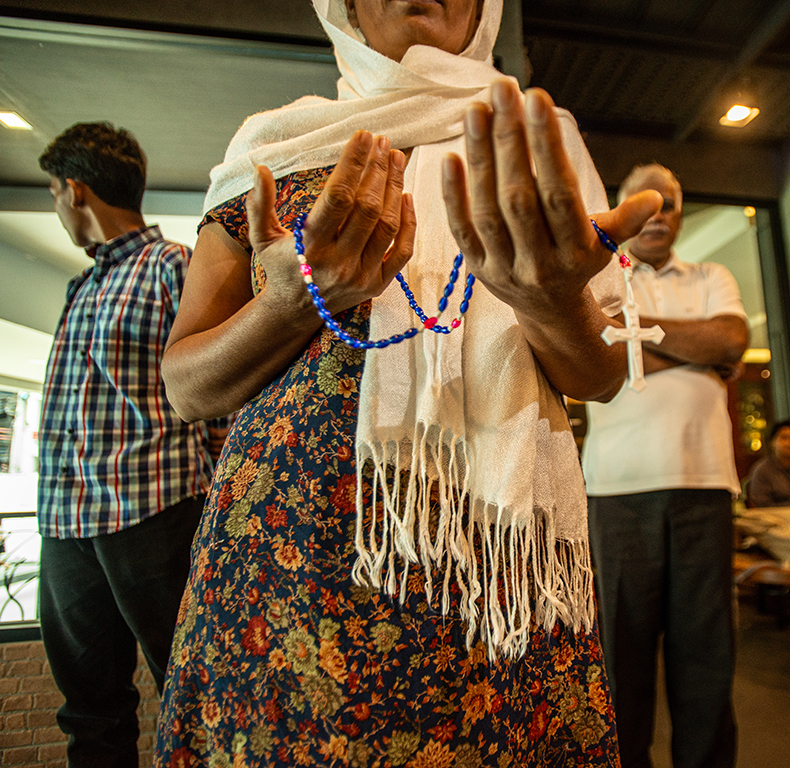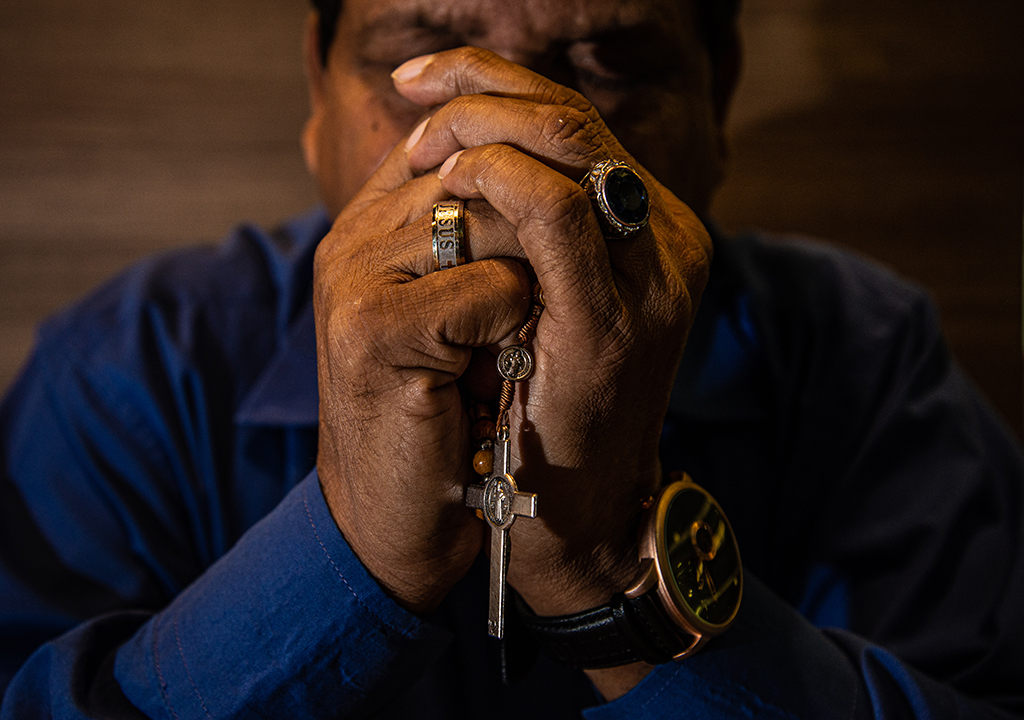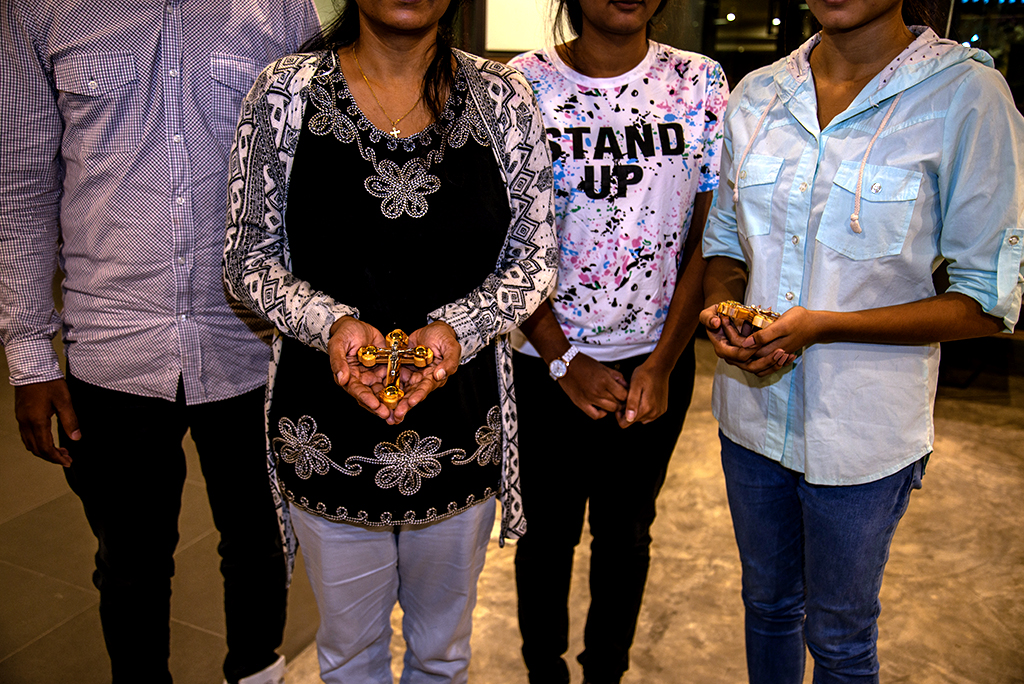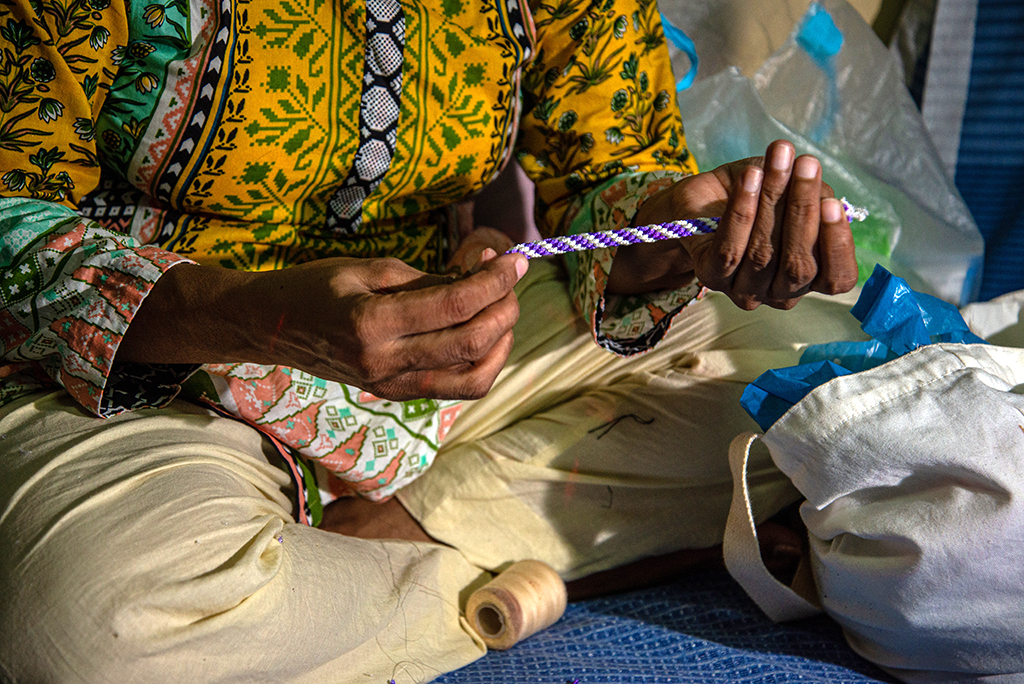The problem is, Joshua wants to go outside. Sometimes he panics when he can’t see his father. Sometimes he gets frustrated with his mother, or scared by a noise outside. Then he cries. He screams. He demands attention.
Attention is the one thing Joshua’s family never wants. There are seven of them living in a one-room apartment with two beds, a desk and two chairs — where they cook chicken biryani for a guest on an electric ring on the floor and use the big bed as their dining room table.
They don’t go outside any more than they have to. It’s seven of them all day, every day occupying less than 400 square feet, including the tiny balcony where they air out their bed sheets. They know they are living in Thailand illegally, but returning home to Pakistan is not an option with a possible death sentence hanging over them under the country’s blasphemy laws. They know Royal Thai Immigration police are sweeping through neighbourhoods, throwing illegals into jail cells. They know the head of Thai Immigration, Lt. Gen. Sompong Chingduang, again warned landlords July 20 to report any foreigners living in their buildings or face stiff fines.
It takes just one scared landlord, one phone call, for Joshua’s family to end up in jail cells at the Immigration Detention Centre in downtown Bangkok.
So they don’t want to be noticed.
They may be illegal migrants in Thailand, but in Canada and most other countries Joshua’s family would be considered refugees. Thailand never signed the 1951 Convention on Refugees, so about 1,500 Pakistani Christians who are in Bangkok and seeking asylum are simply lumped in with anybody else who has overstayed their tourist visa. From the perspective of Thai law, they are a criminal nuisance.
“Every single day I fear being arrested. I am living in darkness, without hope,” Joshua’s grandfather told The Catholic Register.
Joshua’s family is one of 63 who were interviewed in Bangkok the week of July 14 by the Office for Refugees, Archdiocese of Toronto (ORAT) — giving the families a chance to be privately sponsored for resettlement in Canada. It will require a parish, a diocese or some other configuration of Catholics to raise money and make the volunteer commitment, but Canada is perhaps their best and possibly their only hope of creating a normal life and future.
PAKISTAN’S BLASPHEMY laws — meant to combat any show of comptempt toward religion — have grown increasingly harsh since they were inherited from British colonial rule. Beginning with constitutional amendments of 1974 and a program of “Islamicization” of the legal code, Pakistan’s laws became more severe through the 1980s, acquiring the death penalty in 1986.
According to the U.S. Commission on International Religious Freedom’s 2019 annual report, there have been 62 documented cases of murder at the hands of vigilante mobs inspired by Pakistan’s blasphemy laws since 1990.
Many of the Pakistani Christian refugee families in Thailand would face the death penalty under Pakistan’s blasphemy law if they were ever returned home. Many of them have been hunted by vigilante, jihadi assassins.
The Register was not permitted to use real names or take identifying photos of most people interviewed for this story out of safety concerns. They have family still living in Pakistan who would suffer at the hands of mobs in the streets if their pictures or names were to circulate on the Internet.
So we will call Joshua’s grandfather Jonas Saman. He was a community leader in Pakistan who founded and led a local development NGO. He is obsessed with the potential for technical education and training in the
trades to lift young people out of poverty. He was an activist in Pakistan from the age of 18, when he led a Catholic youth group.
"I have a strong belief that as soon as I arrive ... they will kill me."
His daughter Hannah followed in his footsteps, helping women working as domestic servants.
“I grew up watching my father as a social activist,” she said. “I raised my voice with my father.”
There are people who don’t want her or her father back in Pakistan. The turning point for the Saman family was a mob attack on the Christian neighbourhood of Lahore’s Joseph Colony in March of 2013. The attack was sparked by an unsubstantiated accusation of blasphemy against a single resident of the neighbourhood.
The mob torched 178 houses in the Christian neighbourhood. Pakistan’s courts never found anyone criminally responsible.
In the days after the attack, Saman led a protest against the blasphemy law. For that he and his family were threatened with death by the “Guardians of the Prophet’s Companions,” a group Pakistan’s government has officially listed under it’s Anti-Terrorism Act of 1997, but which remains connected to powerful politicians.
“You are now entitled to be slaughtered. We will not spare you,” the Guardians told Saman.
He spent months moving from house to house in Pakistan. Eventually, his relatives and even his parish priest said he ought to take his family out of the country. At 55 he now works illegally and irregularly for Bangkok hotels and restaurants, encouraging customers from the street, handing out flyers, whatever they need him for.
The Samans have moved three times in their five years in Bangkok, trying to keep clear of the immigration police. There was another round-up on July 9, with 51 Pakistani Christians jailed.
George Naz was one of the Christians caught up in that sweep. Naz was also a protest leader back in 2013. He was hit with a fatwa calling for his death, broadcast from the mosque speakers to a crowd of over 1,000 people. Then 150 swore out a charge of blasphemy against him at the police station. “It’s a miracle I’m alive,” Naz told visitors from ORAT.
But Naz now faces the prospect of Thai authorities putting him on a plane back to Pakistan despite his United Nations High Commissioner for Refugees identity card recognizing his legitimate claim to refugee status.
“I have a strong belief that as soon as I arrive in the airport, they will kill me,” he said.
Naz isn’t paranoid.
“The blasphemy law has wide implications,” explained retired Archbishop of Lahore Lawrence Saldanha, who now lives in Toronto. “Many have died. Many have suffered. Many have left their properties, have been looted and so on. They have suffered in many ways. There’s always the threat of blasphemy which hangs over them.”
Pakistan’s blasphemy law and its attendant death penalty is matched up with a dysfunctional legal system that allows mullahs to preside as judges and gangs to threaten police who try to enforce the law.
The refugee-volunteers with Fr. Mick Kelly’s refugee ministry in Bangkok estimate 20 Pakistani Christians have died in the Immigration Detention Centre over the past five years. Hijaz Pares was one of them. He suffered two heart attacks while in immigration detention in 2016 and 2017. The second one killed him.
“On the day he died, he told authorities he was sick — asked to go to the hospital,” said his wife Shahida, who is left to care for her three children, aged three to 13, along with her in-laws and, most of all her disabled, wheelchair- bound brother-in-law Noman, 25.
Her husband wasn’t sent to hospital because the family hadn’t been able to pay the bill from his first heart attack. Instead he was sent to a dark room with a few other inmates.
“We never knew this would happen in Thailand, that we would be considered illegal immigrants,” she said. “Now I can’t sleep.”
She patrols her building at night, watching for police. Her children haven’t gone to school for four years. Thirteen-year-old Joel has shouldered the responsibility for helping his mother, including carrying Noman four floors up and down the stairs of their building when they have to go out.
The single women heading households in Bangkok have almost universally been diagnosed with depression. Peace Samuel occupies her tiny apartment with her three children and the memory of a mob that came after her for talking to women about their rights. The former Catholic school accountant volunteered on weekends with her parish, teaching poor women in villages — Christian and Muslim — about women’s rights. The wife of a village mullah attended the program and afterward spoke to Peace about the abuse she suffered at the hands of her husband.
When Peace sought protection for the mullah’s wife, word got back to the man. He came after Peace with a gang of his friends and followers.
"I can just pray, pray to God that He will help her..."
Outside the local hospital, the mullah’s gang grabbed Peace and began to tear her clothes.
“I was so scared. I cried. My clothes are torn and I was not able to cover myself,” she said.
Some bystanders protected her. She survived and the mullah’s threats eventually receded. But when the Joseph Colony riot took place, she was interviewed by a TV reporter. One of the mullah’s friends recognized her and began shouting threats as she was being interviewed. At her husband’s urging she fled the country with her two daughters and teenaged son. Her husband was to follow later, but then Thailand stopped issuing tourist visas to Pakistanis.
The Samuels have been apart for five years.
Like most of the Christian refugees in Bangkok, the UNHCR denied Peace refugee status. She admits she confused details in recalling the traumatic events. The team from the ORAT office still found the UNHCR decision on her case shocking and unconscionable.
The UNHCR tells The Catholic Register each case is assessed individually. It would not comment on stories circulating in the Christian refugee community about a Muslim Urdu interpreter who minimized or mistranslated testimony about blasphemy charges and mob violence.
While Canada usually relies on the UNHCR for a first assessment, ORAT can present cases to Immigration, Refugees and Citizenship Canada for a separate assessment for private sponsorship.
“Two out of three (Christian refugees haven’t received UNHCR recognition) in the most dubious circumstances,” said Kelly, who has been working with the Pakistani Christian refugees for five years. “Which reflects the cultural pre-suppositions of the UNHCR that blinker it to human need, because they put these rigid expectations on people in terms of fluency in English, understanding the documentary process that’s required for refugee status — unappreciative of the fact that most of them are traumatized and that they are constantly looking backwards, whereas the UNHCR wants them to look forward and say why they can’t go home.”
SAMUELS AND her three children have lived in five or six different apartments in Bangkok. The worst was a shelter where they had to wash dishes inside the bathroom, said Jass.
In their current apartment, 46-year-old Peace sleeps with her 20-year-old daughter Charlotte and 15-year-old Jass in the bed. Her son Nabeel, 22, sleeps on the floor beside them. The women spend long stretches sitting on the bed weaving strips of plastic made from sliced up water bottles into bracelets and purses. Jass volunteers to teach catechism to children at their church. Nabeel picks up work on construction sites.
Jass sees how the stress has worn her mother down.
“I can just pray, pray to God that He will help her,” she said.
Jass dreams of becoming a fashion designer and making elegant dresses for her mother.
Peace is proud of her children, who have grown up in crowded little apartments and without school.
“In every situation they are with me. They stand with me,” she said. “Sometimes we have not enough food, but they didn’t say anything.”
In Joshua’s apartment, a statue of Our Lady of Fatima and another of the Sacred Heart of Jesus sit on a high shelf, with a rosary hung between them. After his stroke, and the craniotomy that followed, Joshua’s parents went every day to the hospital to pray the rosary at their son’s bedside. Hannah, his mother, trusts everything to Mary.
“Why I love Mary is because she is the holiest woman in the world,” she said. “Because her son, our God, cannot refuse prayers to her.”
She now prays that kind Canadians will sponsor her and her family out of limbo and into a new life.


